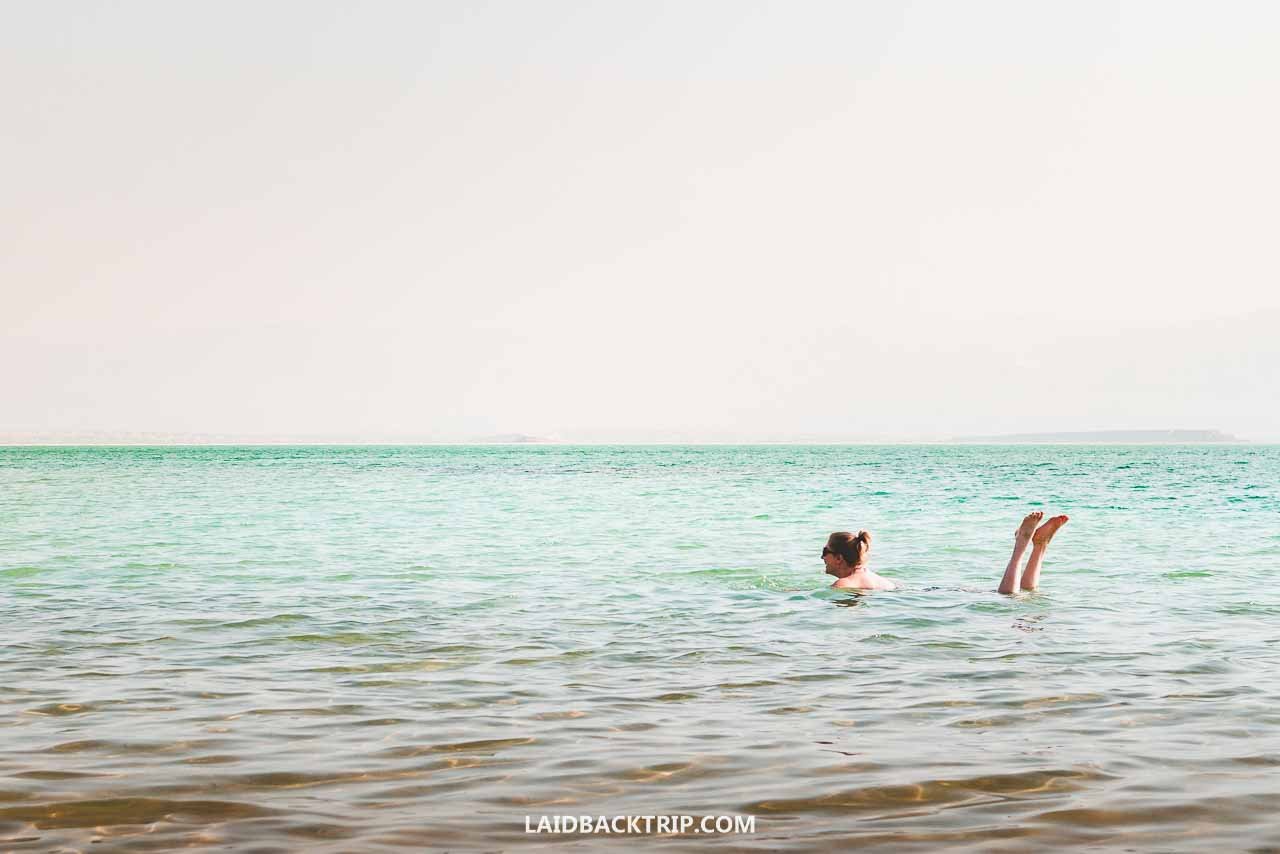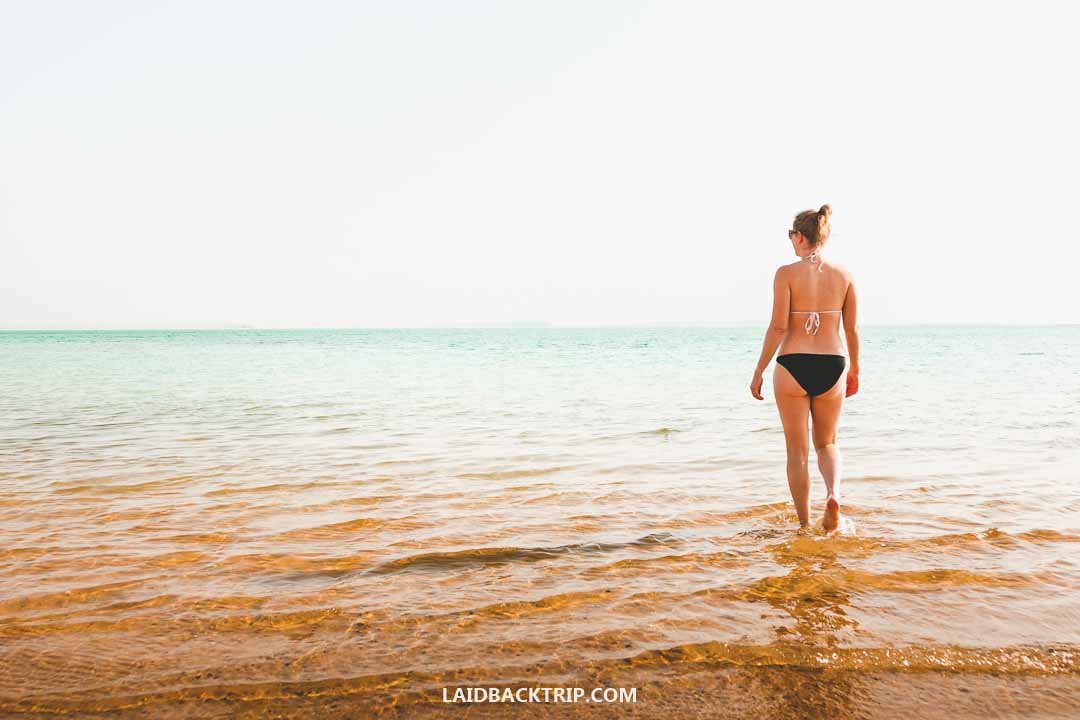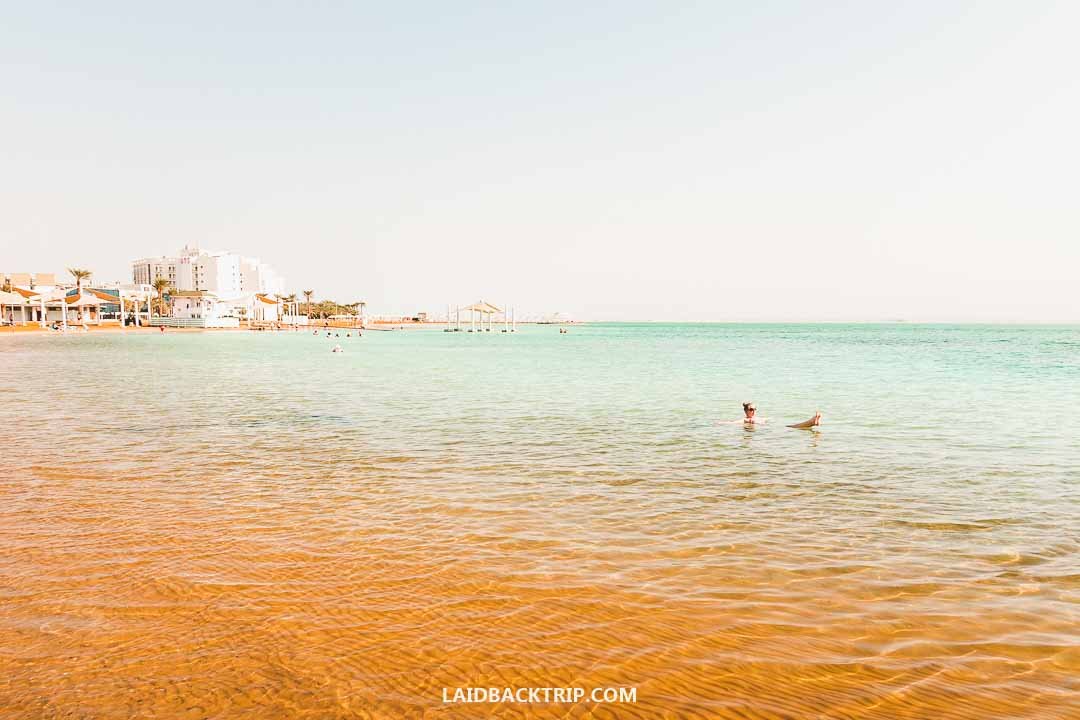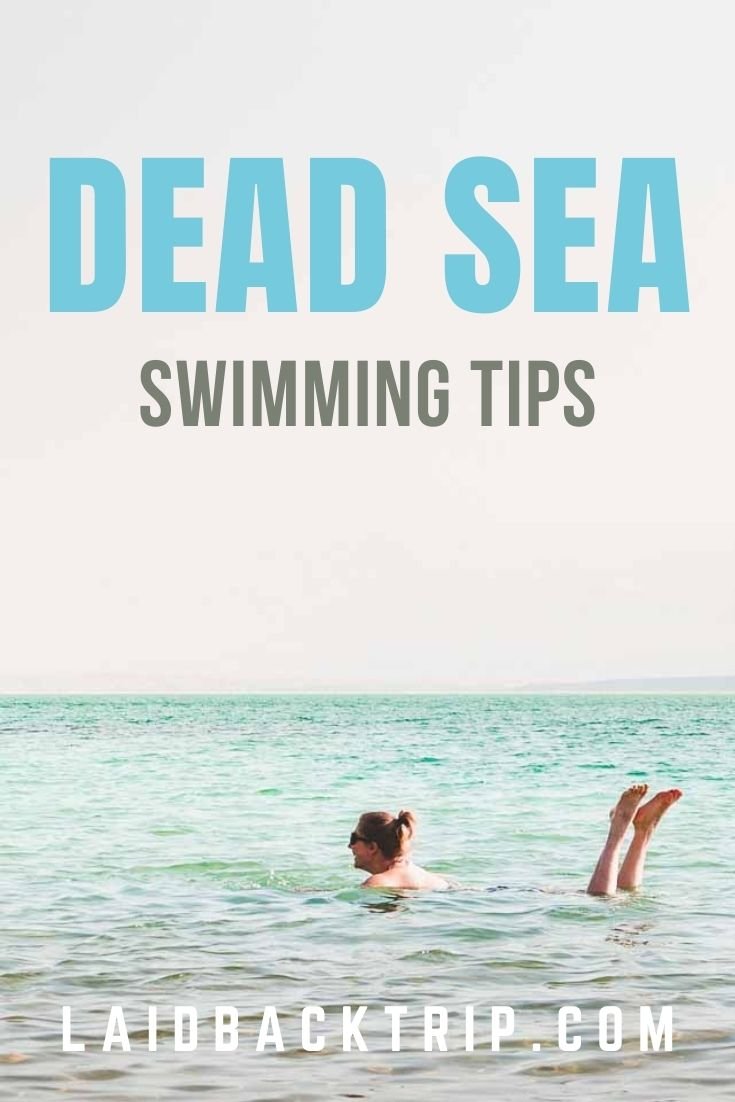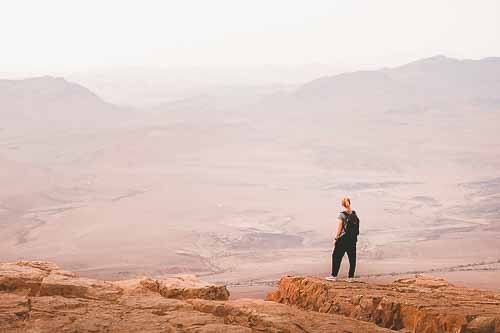10 Quick and Easy Tips for Swimming in the Dead Sea
Having been to the lowest place on Earth twice already, here are some helpful tips for swimming in the Dead Sea for first-time visitors. Regardless of whether you go swimming in the Dead Sea in Israel or Jordan, we got you covered.
Regardless of whether you find a spot on the Dead Sea Highway in Jordan or enjoy the Dead Sea in Israel, swimming in this massive salt lake is an unforgettable experience.
And while your first thoughts might wander to the eye-catching photos of luxury hotels on the lake's shores or turquoise pools encompassed by pearl white lines, there are some things you should know about swimming in the Dead Sea before you go.
So one of the most important facts to know about the Dead Sea is that it's about ten times saltier than the regular sea.
Therefore, normal swimming is nearly impossible here, and many people call it just floating.
While, in reality, it's actually possible to do a few backstrokes there, it's not what this place is about.
The Dead Sea waters and mud are mainly known for properties that cure skin conditions, and the low altitude with plenty of oxygen helps with respiratory problems.
As you would expect, the Dead Sea is one of the must-visit places in both Israel and Jordan.
And while the Dead Sea is shrinking every year until it might be gone one day, it still offers some of the best travel experiences you can have while there.
So here's everything you need to know about swimming in the Dead Sea before you go.
Enjoy the Experience
Once you start reading tips on swimming in the Dead Sea, you quickly realize that this activity requires a lot of discipline and don'ts.
While the advice is always well-meant, it might make you all stressed out.
What really happens if a single drop gets into my eye? What if I drop my camera while I'm in the lake? And so on.
Well, if some water gets into your eye, you won't (probably) die. It will be painful for a short time until you wash it.
And if you drop your camera into the water, it doesn't matter whether you're in the Dead Sea or the Red Sea. It will be ruined anyway.
So stop worrying about what might happen, and try to have some fun while there.
Whether you come here on a day trip from Jerusalem or you're staying in Ein Bokek for a week, enjoy yourself, take your time, and embrace the experience.
Stay in the moment. The Dead Sea is all about leisure and respite.
If you've ever seen the famous photos of people reading newspapers in the Dead Sea, then this should be your mindset.
If you happen to visit a beach with mud (it is usually provided in the containers, so you don't get it yourself), then put some mud on your skin.
And despite its consistency, it's been researched that mud is great for your skin. Simply put, make sure to get the most of your trip; most of us don't visit this place annually.
The Dead Sea is known for medical treatments and tourism, so you can find some great beaches and facilities here.
So now that we've established that the Dead Sea adventure should be fun and not a misery, we can move on to some of the advice that you should follow to have a better experience.
Avoid Splashing
No splashing. Last year when swimming in the Dead Sea in Jordan, a couple of water droplets got into one of my eyes after only a few seconds in the water.
And believe me, it's not the happiest memory I have from the Dead Sea trip.
Obviously, the easiest way to avoid water in your eyes is to follow this advice. Take your time and enter the water slowly.
Save plunging yourself into the water for the Red Sea.
On top of that, you can wear some cheap or old sunglasses that will keep your eyes safe against some accidental splashing.
So this year, I took a dip into the Dead Sea with care, and it really paid off as I didn't have to spend the next few minutes frantically flushing my eye with fresh water.
Never Put Your Head Underwater
While you might have the temptation to put your face or even your entire head underwater in the Dead Sea, we would strongly oppose this idea.
Keeping your head above water is like rule number one while in the Dead Sea area.
We're not sure who was the first poor soul who had to endure this experiment in the name of science, but we should all appreciate their sacrifice.
So what is the best way to get into the water without splashing and keeping your head above the surface?
Everyone has a different approach, and it never hurts to watch some seasoned swimmers from the shore before you try your first attempt.
You can try our favorite method.
Start walking into the lake, and once you're about waist-deep in the water, imagine that you want to sit on a chair.
Slowly imitate the motion, and the super dense water should soon enough start supporting your body's weight and prevent it from sinking.
You can also sort of crawl into water and lie down in the water belly-first.
Keep in mind that it's almost impossible to keep your legs underwater in this position, making it a bit more advanced (and dangerous) technique.
Who would have thought that getting into the water in the Dead Sea is such an elaborate thing?
Don't Shave Before You Go
Unless you want to feel every cut and scratch on your body, postpone shaving until you leave the Dead Sea area.
It's often recommended that you should avoid shaving at least a day or two before swimming in the Dead Sea.
What if you tripped and scraped your knee or elbow the day before? Is it going to hurt? Or what if you have some open cuts or sores?
Again, it's not recommended to swim there.
Even if you have some minor scratches, it's going to be quite a painful experience. We all deal with pain differently, so it's only up to you whether it's worth it or not.
Keep in mind that the phrase rubbing salt into a wound does not exist without reason. It's a cliche, but it's true.
Limit Your Swimming Time
It's often recommended to stay in the water only for ten to twenty minutes.
While you don't need to bring a stopwatch to clock your time in the water, this advice should always be somewhere in the back of your mind.
And why should you restrict the time in the water?
Firstly, your skin gets soft when in the water for a prolonged period, so it's easier to get a cut from the sharp crystals.
Also, our skins are generally soft and tender, therefore not adjusted for the super aggressive properties of the Dead Seas' water.
So the best approach is to get in, stay no longer than roughly fifteen minutes, get out, optionally take a shower, and then repeat the cycle as many times as you want.
If you don't want to clock your time in the water, make sure also to visit Coral Beach Nature Reserve near Eilat or beaches in Tel Aviv, Akko, or Haifa.
Wear Something Old
As we've already mentioned throughout the article, sea salt is highly aggressive. And now imagine that the Dead Sea concentrate is ten times stronger.
Sea salt is terrible with clothing and gear, so it's better to wear something old and expendable for swimming in the Dead Sea.
If you don't have some old swimwear to bring with you, the Earth probably won't stop spinning. Just be prepared that your things might not look the same after your trip to Israel.
Regardless of the age and condition of your clothing and swimwear, don't forget to rinse or wash it in the freshwater afterward.
While it will probably survive the contact with the water without stains, when you put some mud on yourself (and eventually on your swimwear), the chances of leaving stains are much higher.
Also, if you have a habit of bringing some valuable jewelry on your vacations, then leave them behind this time.
Jewelry in the Dead Sea tends to tarnish, so it's better not to wear it there. While it's said that you should be able to clean it afterward, it's probably not worth it.
Wear Water Shoes
While the mineral crystals together with the turquoise water create a spectacular natural show, it's good to know that they are almost razor-sharp.
And walking barefoot over them can be a harrowing experience.
Sure, if you don't have the water shoes, you'll still be able to get into the water, but it won't be for sure a pleasant experience.
And of course, you can even wear good old flip-flops instead of water shoes in the worst-case scenario.
Last year in Jordan, we brought only flip-flops, and while it was better to have something than nothing, walking in the water while wearing them was not comfortable at all.
And while even in places such as Ein Bokek that have a sandy beach and the water shoes are not needed, you can still use them when walking on the scorching sand in the summer.
Protect Your Gear
We all want to take a picture of our partners, friends, family members, or even ourselves swimming in the Dead Sea, but it's better to take a bit more careful approach this time.
We like to keep our cameras, phones, or whatever we've brought to the beach in either a dry sack or a day pack when not using it.
The problem here at the Dead Sea is not only your salty hands but also the salt particles in the air.
As it doesn't require too much effort, try to protect your expensive gear whenever you can.
Swimmers who can't live without using a regular watch or smartwatch during this activity should also keep them in the hotel room.
While the manufactures usually claim that it can resist seawater, the Dead Sea has an entirely different level of saltiness, and we wouldn't risk it here.
Staying Safe
When deciding on the best place to swim in the Dead Sea, you should consider choosing the one that has a lifeguard.
Even though we mentioned that it's super easy to float there and you can't sink, you can still drown in the Dead Sea.
Even despite many blog posts claiming it's not possible.
When creating this article, I found records that at least two people drowned in the Dead Sea last year. You might think that's just a coincidence.
Well, then I also found an older article on Haaretz that says that just in 2010, 21 people drowned or nearly drowned in the Dead Sea, according to the Israeli MDA.
Another issue is that the Dead Sea is shrinking as the sea retreats about a meter per year in its northern part.
The lake's shrinkage caused some parts of the shore to now have sinkholes. And not all of them are visible yet.
The best example is the Ein Gedi Beach near the Ein Gedi Nature Reserve, which was closed not that long ago because of the danger of sinkholes.
Swimming on a windy day might come up with another issue except for accidental splashes. If the Dead Sea waters are rough, it's recommended to stay near the shore.
It's probably not very likely that the winds will blow you out to the sea, but you never know, so it's better to be safe than sorry.
Here you will find more tips on staying safe in Israel.
Travel Insurance
We never leave home without travel insurance that was designed to cover our expenses if something goes wrong during the trip.
Travel insurance protects against theft, flight delays, injury, illness, cancellations, and much more.
World Nomads provides travel insurance for travelers to cover their trip essentials, including sports and adventure activities.
SafetyWing is affordable travel insurance for backpackers, long-term travelers, and digital nomads.
Travel smarter and safer!
Don't Forget to Take a Shower
Rinse or wash whatever you brought in the Dead Sea once you get out of the water.
It's better not to wait too long unless you want your clothing to change colors or have stains. And it also applies to your body, not just your gear.
While the salty water won't leave stains on you, it's still very aggressive, and you might start to feel it after a while.
If you have sensitive skin or, for example, some rash, the salt particles you forgot to wash will soon remind you of this mistake.
I had a small cut somewhere behind my ear and didn't rinse this area thoroughly.
As we were driving to Timna Park afterwards, I could literally feel the salt eating through my flesh until I cleaned it properly at the parking lot.
Luckily, the basic facilities in Ein Bokek were free, which is great if you're visiting Israel on a budget.
So here you go. We hope you'll find these tips helpful, and you can let us know in the comments how was your Dead Sea swimming experience.
Travel Resources
Here you can find links to all the travel resources we use and which you might find helpful when planning your next holiday.
Accommodation: When looking for accommodation, we usually search hotels via Booking.com or Hostelworld.
Tours: Although we love to travel independently, some places are better to visit with a guided tour.
We prefer GetYourGuide for its easy-to-use interface and solid reputation. Another great alternative is Viator.
Rental Cars: When going on a road trip, we always use Rentalcars.com, a reliable site for booking a rental car in advance.
Flight Tickets: When looking for flight tickets, you can search Skyscanner to find the best price.
Travel Insurance: World Nomads and SafetyWing cover against risks of travel.
